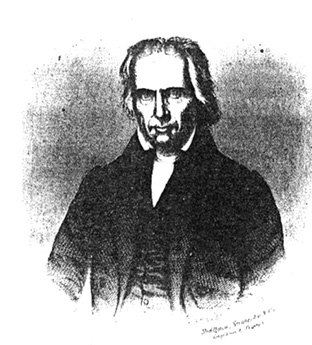Forthcoming Book Chronicles the Horrors of War on Ukrainian Christians
New book chronicles the many phases of the war in the Ukraine: the outbreak of war, daily hardships, evacuation, ongoing ministry, recovery, and renewed hope.
Alexander Campbell provided this description of his father, Thomas Campbell, in a volume called Memoirs of Elder Thomas Campbell, published in 1861. Almost 50 years later, Christian Standard extracted and published this short portion from a chapter entitled, “Prominent Characteristics of Elder Thomas Campbell.” This excerpt was published under the general heading, “Glimpses at the Great and Good.”
_ _ _
By Alexander Campbell
October 16, 1909; p. 26
A supreme devotion to truth in general, but especially to the Truth, and to Him who is the way, the truth and the life, characterized his public and private life. He entertained the loftiest, the richest, and the most soul-stirring conceptions of the peerless majesty, the ineffable beauty and the superlative grandeur of the Lord, in union with a condescending mercy and a tender compassion toward a bewildered, alienated and ruined world.

His unselfish and self-sacrificing spirit knew no limit in its exertions to cheer and comfort the desponding, to animate the disconsolate, to alleviate the afflicted, and to pour the oil of joy and gladness into the broken and disconsolate heart.
His piety was unfeigned, and his communion with God was constant, free, and familiar.
His habits of Bible study furnished him with themes of spiritual contemplation and of edifying conversation.
His deadness to the world, and to all matters of political agitation, enabled him to concentrate his mind and thoughts on themes heavenly and divine.
He seemed to be wholly apathetic on all the themes of political agitation, and took no special interest in them.
He was superlatively averse to evil-speaking, and seemed to cultivate an antipathy against every form of detraction and reproach in all his civil and social intercommunications with society.
His strong aversion to political disquisitions and debates, to party spirit and to party strifes, was characterized by a profound silence on all such themes.
He was uncompromising on all questions of religion and morality.
His endeavors to unite all Christians on a Scriptural and evangelical basis, were earnest and unremitting.
He was peculiarly unambitious of worldly honors and distinctions for himself and family, apathetic of the honors that come from man, and ever condescending to men of low degree.
Hospitality to strangers, without regard to differences of opinion in politics or religion, was a ruling maxim of his life.
He went about continually doing good on the largest scale of all his means and opportunities. “And the case that he knew not, he sought out.”
Though not a professional physician, yet well read in the healing art, he freely waited on the poor and the humble, who were unable to procure professional aid; and in this way mitigated many an agony, and, no doubt, saved some useful lives.
His family discipline was the most perfect that I ever witnessed. He always honored his own word. What he promised, he performed; and what he threatened, he executed and fulfilled to the letter.
The Holy Oracles were not only always on the table, but daily in the hands of his family, children, and servants. They were read in the family every morning, a portion was memorized every day and recited every evening. They were, again and again, reviewed and recited at special intervals; whole Epistles were committed to memory, and repeated especially on Lord’s day evenings. Thus the divine Word became, as it were, incorporated with the minds of his household.
“Attending church” or “going to meeting,” as it happened to be called, was, in his family, a rather grave and serious matter. Every member of the family, child or servant, that attended church, “went to meeting” with the understanding that he or she was to give an account of what was spoken; not only of the text or topic as it was called, but also a sort of synopsis of the discourse. In fact, this review was a miniature of the sermon or lecture, as it happened to be called.
The advantages of this system of household training must, on a little reflection, be obvious to all, but especially to those of a thoughtful and inquisitive mind. The command of one’s own attention is a great, a very great acquisition. It is, indeed, a most valuable science and a most useful art. Not more than a tithe of my intimate acquaintances have either studied or acquired the art and mystery of commanding and directing their own attention.—Memoirs of Thos. Campbell.
New book chronicles the many phases of the war in the Ukraine: the outbreak of war, daily hardships, evacuation, ongoing ministry, recovery, and renewed hope.
We are complex beings described by many things, but perhaps no description could be better than being regarded as faithful.
A revival of church attendance among all church people everywhere will be the finest way in which to begin an evangelistic campaign for the saving of souls.
Daniel Schantz shares an experience that taught him two valuable lessons that everyone in ministry should know.
Jesus showed kindness and goodness throughout his ministry—including on the cross as he promised salvation to a dying thief, asked the Father to forgive his killers, and provided for the care of his mother.
0 Comments